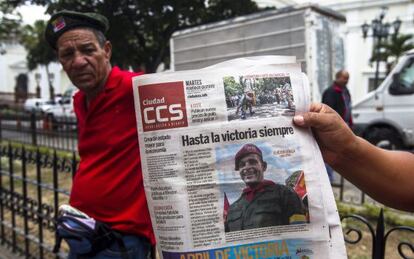Former head of intelligence under Chávez killed
The body of Eliézer Otaiza was found in a wooded area on the outskirts of Caracas President Nicolás Maduro has called for a thorough investigation

The third and definitive death of the former Hugo Chávez intelligence chief Eliézer Otaiza was announced on Monday afternoon. The body had been taken to the central morgue in Caracas on Saturday. Four bullet wounds in the face and chest had disfigured the corpse, local media say. But, at that point, no one knew who he was.
On Monday, when Otaiza, the current president of the Municipal Council of Libertador, did not show up for work, his colleagues noticed his absence and began to worry. Family members thought he had spent the weekend with friends and his friends thought he’d been with his family.
His car turned up in a body shop on Monday. It had a bullet hole in it. When the police announced that the vehicle belonged to Otaiza, an immediate search ensued, leading to the beat up dead body that, two days before, had been turned in at the morgue without identification. The news of his death came at the beginning of the second phase of the so-called economic offensive the government announced last week and overshadowed the political crisis that has dominated the media for three months. President Nicolás Maduro took a break from his announcements to lament the death of the councilman and ordered an investigation. “He had just been promoted to the rank of major in the military,” Maduro said. “He was the man of a 1000 lives...May you rest in peace, Otaiza. I hope you will meet the greatest Commander [Hugo Chávez] in eternal life.”
Otaiza had participated in the second coup attempt on November 27, 1992, nine months after Hugo Chávez was outed for treason against the military. That day airforce units under the command of General Efraín Visconti flew over Caracas and fought to topple Carlos Andrés Pérez and free Chávez from jail. Otaiza suffered serious injuries in the battles. He was shot in the stomach and in a leg. “He was pronounced dead and then he came back to life,” Maduro recounted on Monday. After serving his prison sentence and completing his recovery, Otaiza studied political science at the Simón Bolívar University where he became a disciple of the great Venezuelan intellectual Luis Castro Leiva, a man who died before his time. Otaiza also joined Chávez on his rocky electoral journey to power. He was a member of the Constituent Assembly that wrote the 1999 constitution. In 2000, he became director of Disip, now known as the Bolivarian Intelligence Service. Otaiza came to the post just as the first great schism emerged within the Chavista camp, leading to a separation from the leaders of the 1992 revolt.
Otaiza was the chief of the political police force from 2000 to 2001. His administration was different from those that went before. His loquaciousness distinguished him from the usually discrete leaders who had held the post. He revealed, for example, that he had earned a living as a stripper while he was a cadet at the military academy. During his tenure, the Chavista movement experienced the most damaging scandal of its first phase. Vladimiro Montesinos, former advisor to President Alberto Fujimori, arrived and remained in hiding in Venezuela for six months. It was never known whether Montesinos stayed in the country with Otaiza’s consent. Still, after Montesinos appeared in a working class neighborhood in Caracas in June 2001, Otaiza was relieved of his duties.
He kept a low public profile until 2005, when he faced death for the second time. One night he got into an accident as he was riding a motorcycle in Las Mercedes, an area of restaurants and nightclubs in the city. His companion died and he was badly wounded. Otaiza disappeared from public view for several months while he convalesced. The scandal vanished and the criminal charges he was meant to face were forgotten, swallowed up by time. In recent years, he had held two minor posts. He was president of the Municipal Institute of Sports and Recreation at the mayor’s office in Libertador, an area in the west of Caracas. He also served as president of the municipal legislature of that jurisdiction until December 2013.
His death has unleashed all kinds of speculations about the internal fights within the Chavista movement. Iris Varela, Minister of Corrections, gave life to one version of the story. She first wrote on her Twitter account: “This crime stinks of conspiracy.” And, in a second warble, she let out: “We have to say it. Comrade Eliézer. Your death will be avenged.”
A three-day homage to Otaiza begins this Tuesday. His body will be on view in a funeral chapel at the National Assembly.
Translation: Dyane Jean François
Tu suscripción se está usando en otro dispositivo
¿Quieres añadir otro usuario a tu suscripción?
Si continúas leyendo en este dispositivo, no se podrá leer en el otro.
FlechaTu suscripción se está usando en otro dispositivo y solo puedes acceder a EL PAÍS desde un dispositivo a la vez.
Si quieres compartir tu cuenta, cambia tu suscripción a la modalidad Premium, así podrás añadir otro usuario. Cada uno accederá con su propia cuenta de email, lo que os permitirá personalizar vuestra experiencia en EL PAÍS.
¿Tienes una suscripción de empresa? Accede aquí para contratar más cuentas.
En el caso de no saber quién está usando tu cuenta, te recomendamos cambiar tu contraseña aquí.
Si decides continuar compartiendo tu cuenta, este mensaje se mostrará en tu dispositivo y en el de la otra persona que está usando tu cuenta de forma indefinida, afectando a tu experiencia de lectura. Puedes consultar aquí los términos y condiciones de la suscripción digital.








































